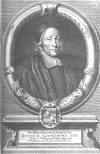
A mighty fortress is our God, a bulwark never failing; our helper he amid the flood of mortal ills prevaling. For still our ancient foe doth seek to work us woe; his craft and power are great, and armed with cruel hate, on earth is not his equal.
Martin Luther (1529)
October 31 is Reformation Day. As we take time to thank the Lord for the recovery of the Gospel, let us not forget the other fruits of the Reformation, such as hymnody. Informed by the recovery of the great truths of Scripture, hymns of the Reformation were Christocentric and theologically astute. They not only aided in worship, but they also acted as a teaching tool. (I used to joke with my former pastor that the hymns protected me from him.)
Salem-Ebenezer Reformed Church in Manitowoc, Wisconsin, has a fine tradition of singing Reformation-period hymns during the month of October (see list below). This is not only a fitting means of giving thanks to the Lord for the Reformation, but it's also a reminder of the often overlooked treasures found in our Reformed and Presbyterian hymns.
Jesus is My Boyfriend Music
Hymnody has fallen on hard times. The Second Great Awakening, Pentecostalism, and the Jesus Movement have taken a toll. No longer are hymns theologically informed and centered upon the Glory and majesty of God; instead, the great truths of Scripture that moved the pens of hymnists have been replaced by the man-centered, lavender quills of romantics.
Dr. Michael Horton, professor of theology and apologetics at Westminster Seminary California, reflects upon this transition in an article titled, Are Your Hymns Too Spiritual? Here's how the article begins:
The average Christian will learn more from hymns than from any systematic theology. Hymns chart progression from classic hymns of the 17th and 18th centuries (especially those of Charles Wesley, Augustus Toplady, John Newton and William Cowper) to the Romantic "songs and choruses" of the 19th and 20th centuries. They reflect the shift from Reformation categories (God, sin and grace, Christ's saving work, the Word, church, sacraments, etc.) to Romantic individualism. We sing, "I come to the garden alone while the dew is still on the roses. And the voice I hear, singing in my ear, the voice of God is calling. And he walks with me and he talks with me, and he tells me I am his own." Or, "He touched me." The number of 19th century hymns that talk about the objective truth of Scripture, and that which God has done outside of my personal experience, is overwhelmed by the number of hymns that focus on my personal experience. It is my heart, not God and his saving work, that receives top billing.
If that was true of the 19th century, the 20th century only exacerbated this emphasis, and the style of the commercial Broadway musical was imitated in songs that elevated personal experience and happiness above God and his glory. Today, the vast majority of entries in the Maranatha, Vineyard, and related praise songbooks are not only burdened with this self-centered and Gnostic tendency, but often contain outright heresy--probably not intentionally, but as a result of sloppy theology. In our day, sloppy theology usually means some form of Gnosticism.
You can read the rest here.
Reformation Hymns
The words for the following hymns were authored in the 16th or 17th centuries.
Hymn and Author
| All People That On Earth Do Dwell | Louis Bourgeois, William Kethe |
| All Praise to God, Who Reigns Above | Johann Schutz |
| Now Blessed Be The Lord Our God | Scottish Psalter |
| Ye Holy Angels Bright | Richard Baxter |
| O Come, Let Us Sing to the Lord | Scottish Psalter |
| Let us, With a Gladsome Mind | John Milton |
| Praise to the Lord, Almighty, the King of Creation | Joachim Neander |
| With Glory Clad, With Strength Arrayed | Tate and Brady's |
| The Lord's My Shepherd | Scottish Psalter |
| A Mighty Fortress Is Our God | Martin Luther |
| Now Thank We All Our God | Martin Rinkart, Johann Cruger |
| O God, We Praise Thee; and Confess | Tate and Brady's |
| Lord, Keep Us Steadfast In Thy Word | Martin Luther |
| Whate'er My God Ordains is Right | Samuel Rodigast |
| O Thou My Soul, Bless God the Lord | Scottish Psalter |
| O Lord, How Shall I Meet Thee? | Paul Gerhardt, Melchior Teschner |
| Fairest Lord Jesus, Ruler of All Nature | Munster Gesangbuch |
| Wondrous King, All-Glorious, Sov'reign Lord Victorious | Joachim Neander |
| Greet Thee Who My Sure Redeemer Art | Strasbourg Psalter |
| Lift Up Your Heads, Ye Mighty Gates! | Georg Weissel |
| Comfort, Comfort Ye My People | Johannes Olearius, Louis Bourgeois |
| All My Heart This Night Rejoices | Paul Gerhardt, Johann Ebeling |
--The Catechizer
Labels: Reformation, Worship














